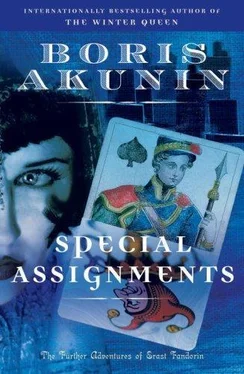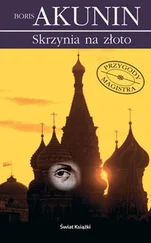'Erast Petrovich, why are you certain that this doctor, Zakharov, has been killed?' Angelina asked.
'Because he has disappeared, although he had no need to,' replied Erast Petrovich. 'Zakharov is not guilty of the murders and he had believed that he was sheltering a fugitive convict, not a bloody killer. But when he realised who he had been sheltering, he was frightened. He kept a loaded revolver beside his bed. He was afraid of you, Sotsky. After the murders in Granatny Lane you returned to the cemetery and saw Tulipov observing Zakharov's office. The guard dog did not bark at you; he knows you very well. Tulipov was absorbed in his observation work and failed to notice you. You realised that suspicion had fallen on Zakharov and decided to exploit the fact. In the report he dictated just before he died, Tulipov states that shortly after ten Zakharov went out of his study and there was some sort of clattering in the corridor. Obviously the murder took place at that very moment. You entered the house silently and waited for Zakharov to come out into the corridor for something. And that is why the rug disappeared from the corridor. It must have had bloodstains on it, so you removed it. When you were finished with Zakharov, you crept outside and attacked Tulipov from behind, inflicting mortal wounds and leaving him to bleed to death. I presume you saw him get up, stagger to the gates and then collapse again. You were afraid to go and finish him, because you knew that he had a weapon, and in any case you knew that his wounds were fatal. Without wasting any time, you dragged Zakharov's body out and buried it in the cemetery. I even know exactly where. You threw it into the April ditch for unidentified bodies and sprinkled earth over it. By the way, do you know how you gave yourself away?'
Sotsky started, and the calm, resigned expression was replaced once again by curiosity, but only for a few moments. Then the invisible curtain came down again, erasing all trace of living feeling.
'When I talked to you yesterday morning, you said you hadn't slept all night, that you had heard the shots, and then the door slamming and the sound of footsteps. That was supposed to make me think that Zakharov was alive and had gone into hiding. But in fact it made me think something else, If the watchman Pakhomenko's ears were sharp enough to hear footsteps from a distance, why could he not hear the blasts that Tulipov gave on his whistle when he came round? The answer is obvious: at that moment you were not in your hut; you were some distance away from the spot - for instance, at the far end of the cemetery, where the April ditch happens to be. That is one. If Zakharov had been the killer, he could not have gone out through the gates, because Tulipov was lying there wounded and had still not come round. The killer would certainly have finished him off. That is two. So now I had confirmation that Zakharov, who I already knew could not be the London maniac, was not involved in Tulipov's death. If he had nonetheless disappeared, it meant that he had been killed. If you bed about the circumstances of his disappearance, it meant that you were involved in it. And I remembered that both murders that were committed according to the "idea", the prostitute Andreichkina and the young beggar, were committed within fifteen minutes' walking distance of the Bozhedomka Cemetery - it was the late investigator Izhitsin who first noticed that, although he drew the wrong conclusions from it. Once I put these facts together with the fragments of phrases from the letter, I was almost certain that the "old comrade" with whom Zakharov sympathised and whom he did not wish to give away was you. Because of your job you were involved in the exhumation of the bodies and you knew a lot about how the investigation was developing. That is one. You were present at the "investigative experiment". That is two. You had access to the graves and the ditches. That is three. You knew Tulipov - in fact you were almost friends. That is four. In the list of those present at the experiment drawn up before he died, you are described as follows.'
Erast Petrovich walked across to the table, picked up a sheet of paper and read from it: 'Pakhomenko, the cemetery watchman. I don't know his first name and patronymic, the labourers call him "Pakhom". Age uncertain: between thirty and fifty. Above average height, strongly built. Round, gentle face, without a moustache or beard. Ukrainian accent. I have had several conversations with him on various subjects. I have listened to the story of his life (he was a wandering pilgrim and has seen a lot of things) and told him about myself. He is intelligent, observant, religious and kind. He has assisted me greatly in the investigation. Perhaps the only one of them whose innocence could not possibly be in the slightest doubt.'
A nice boy' the accused said, touched, and his words made the Collegiate Counsellor's face twitch, while the dispassionate court guard whispered something harsh and hissing in Japanese.
Even Angelina shuddered as she looked at the man in the chair.
'You made use of Tulipov's revelations on Friday when you entered his apartment and committed a double murder,' Erast Petrovich continued after a brief pause. And as for my ... domestic circumstances, they are known to many people, and Zakharov could have told you about them. So today or, in fact, yesterday morning already, I had only one suspect left: you. But I still had a few things to do. Firstly, establish what Sotsky looked like, secondly ascertain whether he really was dead and, finally, find witnesses who could identify you. Stenich described Sotsky to me as he was seven years ago. You have probably changed greatly in seven years, but height, the colour of the eyes and the shape of the nose are not subject to change, and all of those features matched. A telegram from the Department of Military Justice which included the details of Sotsky's time in prison and his supposedly unsuccessful attempt to escape, made it clear that the convict could quite well still be alive. My greatest difficulty was with witnesses. I had high hopes of the former "sadist" Filipp Rozen. When he spoke about Sotsky in my presence, he used a strange phrase that stuck in my memory. "He's dead, but I keep thinking I see him everywhere. Take yesterday ..." He never finished the phrase - someone interrupted him. But on that "yesterday", that is, on the fourth of April, Rozen was with Zakharov and the others at the cemetery. I wondered if he might have seen the watchman Pakhomenko there and spotted a resemblance to his old friend. Unfortunately I wasn't able to locate Rozen. But I did find a prostitute you tried to kill seven weeks ago at Shrovetide. She remembered you very well and she can identify you. At that stage I could have arrested you; there were enough solid clues. That is what I would have done if you yourself had not gone on the offensive. Then I realised that there is only way to stop someone like you
Sotsky appeared not to notice the threat behind these words. At least, he did not show the slightest sign of alarm - on the contrary, he smiled absent-mindedly at his own thoughts.
Ah yes, and there was the note that was sent to Burylin,' Fandorin remembered. A rather clumsy move. The note was really intended for me, was it not? The investigators had to be convinced that Zakharov was alive and in hiding. You even tried to imitate certain distinctive features of Zakharov's handwriting, but you only reinforced my conviction that the suspect was not an illiterate watchman but an educated man who knew Zakharov well and was acquainted with Burylin. That is - Sotsky Your telephone call when you took advantage of the technical shortcomings of the telephone to pretend to be Zakharov could not deceive me either. I have had occasion to use that trick myself. Your intention was also quite clear. You always act according to the same monstrous logic: if you find someone interesting, you kill those who are most dear to him. That was what you did in Tulipov's case. That was what you wanted to do with the daughter of the prostitute who had somehow attracted your perverted attention. You mentioned my Japanese servant very specifically - you clearly wanted him to come with me. Why? Why, of course, so that Angelina Samsonovna would be left at home alone. I would rather not think about the fate that you had in mind for her. I might not be able to restrain myself and
Читать дальше











